| Listing 1 - 10 of 33 | << page >> |
Sort by
|
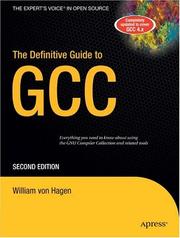
ISBN: 9781430202196 1590595858 9781590595855 9786613250650 143020219X 1283250659 Year: 2006 Publisher: Berkeley, Calif. : Apress,
Abstract | Keywords | Export | Availability | Bookmark
 Loading...
Loading...Choose an application
- Reference Manager
- EndNote
- RefWorks (Direct export to RefWorks)
The GNU Compiler Collection (GCC) offers a variety of compilers for different programming languages including C, C++, Java, Fortran, and Ada. The Definitive Guide to GCC, Second Edition has been revised to reflect the changes made in the most recent major GCC release, version 4. Providing in-depth information on GCC's enormous array of features and options, and introducing crucial tools such as autoconf, gprof, and libtool, this book functions as both a guide and reference. This book goes well beyond a general introduction to GCC and covers key programming techniques such as profiling and optimization that, when used in conjunction with GCC's advanced features, can greatly improve application performance. This second edition will prove to be an invaluable resource, whether youre a student seeking familiarity with this crucial tool or an expert who uses GCC on a daily basis.
Computer Science. --- Software Engineering/Programming and Operating Systems. --- Computer science. --- Software engineering. --- Informatique --- Génie logiciel --- Compilers (Computer programs). --- Compilers (Computer programs) -- Congresses. --- Parallel processing (Electronic computers) -- Congresses. --- Programming languages (Electronic computers) -- Congresses. --- Compilers (Computer programs) --- Engineering & Applied Sciences --- Computer Science --- Compiling programs (Computer programs) --- Computer programs --- Programming software --- Systems software --- Programming Languages, Compilers, Interpreters. --- Computer software engineering --- Engineering --- Informatics --- Science --- Programming languages (Electronic computers). --- Computer languages --- Computer program languages --- Computer programming languages --- Machine language --- Electronic data processing --- Languages, Artificial
Book
ISBN: 365801783X 3658017848 Year: 2014 Publisher: Wiesbaden [Germany] : Springer Vieweg,
Abstract | Keywords | Export | Availability | Bookmark
 Loading...
Loading...Choose an application
- Reference Manager
- EndNote
- RefWorks (Direct export to RefWorks)
The significance of electrical and electronic systems has increased considerably in the last few years and this trend is set to continue. The characteristics feature of innovative systems is the fact that they can work together in a network. This requires powerful bus systems that the electronic control units can use to exchange information. Networking and the various bus systems used in motor vehicles are the prominent new topic in the 5th edition of the "Automotive Electric, Automotive Electronics" technical manual. The existing chapters have also been updated, so that this new edition brings the reader up to date on the subjects of electrical and electronic systems in the motor vehicle. Content Electrical and electronical systems – Basic principles of networking - Examples of networked vehicles – Bus systems – Architecture of electronic systems – Mechatronics – Elektronics – Electronic control Units – Software – Sensors – Actuators – Hybrid drives – Vehicle electrical system – Starter battery – Alternator – Starting system – Electromagnetic compatibility – Circuit diagrams Target audience Automotive engineers completing further education Automotive foremen and mechanics in automotive repair shops Teachers and lecturers in vocational schools Students at colleges and technical schools and all those interested in automotive engineering Publisher Bosch is one of the world´s leading suppliers to the automotive industry. The large number of applications for patents and utility models is impressive proof of the company´s leading position in automotive engineering.
Automobiles --- Automotive computers. --- Electronic equpiment. --- Automotive computers -- Congresses. --- Microprocessors -- Congresses. --- Programmable controllers -- Congresses. --- Automotive microcontrollers --- Engineering. --- Automotive engineering. --- Engines. --- Machinery. --- Engine Technology. --- Automotive Engineering. --- Microcontrollers --- Autos (Automobiles) --- Cars (Automobiles) --- Gasoline automobiles --- Motorcars (Automobiles) --- Motor vehicles --- Transportation, Automotive --- Electronic equipment --- Construction --- Industrial arts --- Technology --- Machinery --- Machines --- Manufactures --- Power (Mechanics) --- Mechanical engineering --- Motors --- Power transmission --- Curious devices --- Electronic equipment.
Book
ISBN: 9048197937 9786613002723 9048197945 1283002728 Year: 2010 Publisher: Dordrecht : Springer,
Abstract | Keywords | Export | Availability | Bookmark
 Loading...
Loading...Choose an application
- Reference Manager
- EndNote
- RefWorks (Direct export to RefWorks)
Computer and Information Sciences is a unique and comprehensive review of advanced technology and research in the field of Information Technology. It provides an up to date snapshot of research in Europe and the Far East (Hong Kong, Japan and China) in the most active areas of information technology, including Computer Vision, Data Engineering, Web Engineering, Internet Technologies, Bio-Informatics and System Performance Evaluation Methodologies.
Computers -- Congresses. --- Information technology -- Congresses. --- Computer science --- Electrical & Computer Engineering --- Engineering & Applied Sciences --- Applied Physics --- Electrical Engineering --- Technology - General --- Computers --- Information technology --- Computer graphics. --- Computer vision. --- Computer Graphics. --- Computer Imaging, Vision, Pattern Recognition and Graphics. --- Machine vision --- Vision, Computer --- Artificial intelligence --- Image processing --- Pattern recognition systems --- Automatic drafting --- Graphic data processing --- Graphics, Computer --- Computer art --- Graphic arts --- Electronic data processing --- Engineering graphics --- Digital techniques --- Optical data processing. --- Optical computing --- Visual data processing --- Bionics --- Integrated optics --- Photonics --- Optical equipment
Book
ISBN: 3642259855 9786613452726 1283452723 3642259863 Year: 2011 Publisher: Berlin : Springer,
Abstract | Keywords | Export | Availability | Bookmark
 Loading...
Loading...Choose an application
- Reference Manager
- EndNote
- RefWorks (Direct export to RefWorks)
MSEC2011 is an integrated conference concentrating its focus upon Multimedia ,Software Engineering, Computing and Education. In the proceeding, you can learn much more knowledge about Multimedia, Software Engineering, Computing and Education of researchers all around the world. The main role of the proceeding is to be used as an exchange pillar for researchers who are working in the mentioned field. In order to meet high standard of Springer, AISC series ,the organization committee has made their efforts to do the following things. Firstly, poor quality paper has been refused after reviewing course by anonymous referee experts. Secondly, periodically review meetings have been held around the reviewers about five times for exchanging reviewing suggestions. Finally, the conference organization had several preliminary sessions before the conference. Through efforts of different people and departments, the conference will be successful and fruitful.
Computers -- Congresses. --- Multimedia systems -- Congresses. --- Software engineering -- Congresses. --- Engineering & Applied Sciences --- Computer Science --- Multimedia systems --- Software engineering --- Computer systems --- ADP systems (Computer systems) --- Computing systems --- Systems, Computer --- Engineering. --- Software engineering. --- Multimedia information systems. --- Computational intelligence. --- Computational Intelligence. --- Multimedia Information Systems. --- Software Engineering/Programming and Operating Systems. --- Intelligence, Computational --- Artificial intelligence --- Soft computing --- Computer-based multimedia information systems --- Multimedia computing --- Multimedia information systems --- Multimedia knowledge systems --- Information storage and retrieval systems --- Computer software engineering --- Engineering --- Construction --- Industrial arts --- Technology --- Electronic systems --- Cyberinfrastructure --- Multimedia systems.
Book
ISBN: 1489990089 1461437725 9786613845627 1461437733 1283533170 Year: 2012 Publisher: New York : Springer,
Abstract | Keywords | Export | Availability | Bookmark
 Loading...
Loading...Choose an application
- Reference Manager
- EndNote
- RefWorks (Direct export to RefWorks)
Financial Decision Making Using Computational Intelligence covers all the recent developments in complex financial decision making through computational intelligence approaches. Computational intelligence has evolved rapidly in recent years and it is now one of the most active fields in operations research and computer science. The increasing complexity of financial problems and the enormous volume of financial data often make it difficult to apply traditional modeling and algorithmic procedures. In this context, the field of computational intelligence provides a wide range of useful techniques, including new modeling tools for decision making under risk and uncertainty, data mining techniques for analyzing complex data bases, and powerful algorithms for complex optimization problems. This book presents the recent advances made in financial decision making using computational intelligence, covering both new methodological developments as well as new emerging application areas. This work covers a wide range of topics related to financial decision making, financial modeling, risk management, and financial engineering, including algorithmic trading, financial time-series analysis, asset pricing, portfolio management, auction markets, and insurance services. Practitioners in the financial industry as well as operations researchers, management scientists, and data analysts will find this publication highly useful.
Business -- Data processing -- Congresses. --- Computational intelligence -- Congresses. --- Computers -- Congresses. --- Finance --- Computational intelligence --- Civil & Environmental Engineering --- Business & Economics --- Engineering & Applied Sciences --- Operations Research --- Financial Management & Planning --- Finance - General --- Data processing --- Decision making --- Mathematical models --- Decision making. --- Data processing. --- Deciding --- Decision (Psychology) --- Decision analysis --- Decision processes --- Making decisions --- Management --- Management decisions --- Mathematics. --- Finance. --- Operations research. --- Management science. --- Operations Research, Management Science. --- Finance, general. --- Choice (Psychology) --- Problem solving --- Funding --- Funds --- Economics --- Currency question --- Quantitative business analysis --- Operations research --- Statistical decision --- Operational analysis --- Operational research --- Industrial engineering --- Management science --- Research --- System theory
Book
ISBN: 3642012159 3642012167 Year: 2009 Publisher: Berlin ; Heidelberg : Springer,
Abstract | Keywords | Export | Availability | Bookmark
 Loading...
Loading...Choose an application
- Reference Manager
- EndNote
- RefWorks (Direct export to RefWorks)
This volume of Advances in Soft Computing and Lecture Notes in Computer Science vols. 5551, 5552 and 5553, constitute the Proceedings of the 6th International Symposium of Neural Networks (ISNN 2009) held in Wuhan, China during May 26 - 29, 2009. ISNN is a prestigious annual symposium on neural networks with past events held in Dalian (2004), Chongqing (2005), Chengdu (2006), Nanjing (2007) and Beijing (2008). Over the past few years, ISNN has matured into a well-established series of international conference on neural networks and their applications to other fields. Following this tradition, ISNN 2009 provided an academic forum for the participants to disseminate their new research findings and discuss emerging areas of research. Also, it created a stimulating environment for the participants to interact and exchange information on future research challenges and opportunities of neural networks and their applications.
Computational intelligence -- Congresses. --- Neural computers -- Congresses. --- Neural networks (Computer science) -- Congresses. --- Civil & Environmental Engineering --- Engineering & Applied Sciences --- Civil Engineering --- Computer Science --- Applied Mathematics --- Neural networks (Computer science) --- Computational intelligence --- Computer science. --- Artificial intelligence. --- Applied mathematics. --- Engineering mathematics. --- Computer Science. --- Artificial Intelligence (incl. Robotics). --- Appl.Mathematics/Computational Methods of Engineering. --- Engineering --- Engineering analysis --- Mathematical analysis --- AI (Artificial intelligence) --- Artificial thinking --- Electronic brains --- Intellectronics --- Intelligence, Artificial --- Intelligent machines --- Machine intelligence --- Thinking, Artificial --- Bionics --- Cognitive science --- Digital computer simulation --- Electronic data processing --- Logic machines --- Machine theory --- Self-organizing systems --- Simulation methods --- Fifth generation computers --- Neural computers --- Informatics --- Science --- Mathematics --- Artificial Intelligence. --- Mathematical and Computational Engineering.
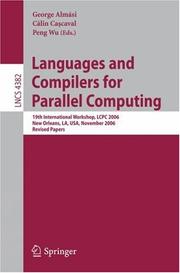
ISBN: 9783540725206 3540725202 9786610938414 1280938412 3540725210 Year: 2007 Publisher: Berlin, Heidelberg : Springer Berlin Heidelberg : Imprint: Springer,
Abstract | Keywords | Export | Availability | Bookmark
 Loading...
Loading...Choose an application
- Reference Manager
- EndNote
- RefWorks (Direct export to RefWorks)
The 19th Workshop on Languages and Compilers for Parallel Computing was heldinNovember2006inNewOrleans,LouisianaUSA.Morethan40researchers from around the world gathered together to present their latest results and to exchange ideas on topics ranging from parallel programming models, code generation,compilationtechniques,paralleldatastructureandparallelexecution models,toregisterallocationandmemorymanagementinparallelenvironments. Out of the 49 paper submissions, the Program Committee, with the help of external reviewers, selected 24 papers for presentation at the workshop. Each paper had at least three reviews and was extensively discussed in the comm- tee meeting. The papers were presented in 30-minute sessions at the workshop. One of the selected papers, while still included in the proceedings, was not p- sented because of an unfortunate visa problem that prevented the authors from attending the workshop. We werefortunateto havetwooutstanding keynoteaddressesatLCPC2006, both from UC Berkeley. Kathy Yelick presented “Compilation Techniques for Partitioned Global Address Space Languages.” In this keynote she discussed the issues in developing programming models for large-scale parallel machines and clusters, and how PGAS languages compare to languages emerging from the DARPA HPCS program.She also presented compiler analysis and optimi- tion techniques developed in the context of UPC and Titanium source-to-source compilers for parallel program and communication optimizations.
Parallel processing (Electronic computers) --- Programming languages (Electronic computers) --- Compilers (Computer programs) --- Parallélisme (Informatique) --- Langages de programmation --- Compilateurs (Logiciels) --- Congresses. --- Congrès --- Compilers (Computer programs) -- Congresses. --- Parallel processing (Electronic computers) -- Congresses. --- Programming languages (Electronic computers) -- Congresses. --- Engineering & Applied Sciences --- Computer Science --- Computer science. --- Arithmetic and logic units, Computer. --- Computer communication systems. --- Computer programming. --- Programming languages (Electronic computers). --- Data structures (Computer science). --- Computers. --- Computer Science. --- Programming Languages, Compilers, Interpreters. --- Programming Techniques. --- Computation by Abstract Devices. --- Computer Communication Networks. --- Arithmetic and Logic Structures. --- Data Structures. --- Automatic computers --- Automatic data processors --- Computer hardware --- Computing machines (Computers) --- Electronic brains --- Electronic calculating-machines --- Electronic computers --- Hardware, Computer --- Computer systems --- Cybernetics --- Machine theory --- Calculators --- Cyberspace --- Information structures (Computer science) --- Structures, Data (Computer science) --- Structures, Information (Computer science) --- Electronic data processing --- File organization (Computer science) --- Abstract data types (Computer science) --- Computer languages --- Computer program languages --- Computer programming languages --- Machine language --- Languages, Artificial --- Computers --- Electronic computer programming --- Electronic digital computers --- Programming (Electronic computers) --- Coding theory --- Communication systems, Computer --- Computer communication systems --- Data networks, Computer --- ECNs (Electronic communication networks) --- Electronic communication networks --- Networks, Computer --- Teleprocessing networks --- Data transmission systems --- Digital communications --- Electronic systems --- Information networks --- Telecommunication --- Cyberinfrastructure --- Network computers --- Arithmetic and logic units, Computer --- Computer arithmetic --- Informatics --- Science --- Programming --- Distributed processing --- Circuits --- Data structures (Computer scienc. --- Compilers (Computer programs). --- Computer networks. --- Computer arithmetic and logic units. --- Artificial intelligence—Data processing. --- Compilers and Interpreters. --- Theory of Computation. --- Data Science. --- Compiling programs (Computer programs) --- Computer programs --- Programming software --- Systems software
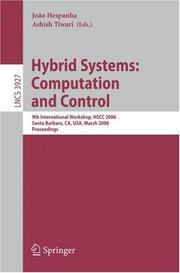
ISSN: 03029743 ISBN: 3540331700 9783540331704 3540331719 Year: 2006 Volume: 3927 Publisher: Berlin ; New York : Springer,
Abstract | Keywords | Export | Availability | Bookmark
 Loading...
Loading...Choose an application
- Reference Manager
- EndNote
- RefWorks (Direct export to RefWorks)
Hybrid computers --- Calculateurs hybrides --- Congresses. --- Congrès --- Digital control systems --- Computer Science --- Electrical Engineering --- Engineering & Applied Sciences --- Electrical & Computer Engineering --- Congrès --- EPUB-LIV-FT SPRINGER-B --- Computer science. --- Microprocessors. --- Special purpose computers. --- Software engineering. --- Computers. --- Computer logic. --- Computer Science. --- Theory of Computation. --- Special Purpose and Application-Based Systems. --- Processor Architectures. --- Logics and Meanings of Programs. --- Software Engineering. --- Computation by Abstract Devices. --- Computer science logic --- Logic, Symbolic and mathematical --- Automatic computers --- Automatic data processors --- Computer hardware --- Computing machines (Computers) --- Electronic brains --- Electronic calculating-machines --- Electronic computers --- Hardware, Computer --- Computer systems --- Cybernetics --- Machine theory --- Calculators --- Cyberspace --- Computer software engineering --- Engineering --- Special purpose computers --- Computers --- Minicomputers --- Informatics --- Science --- Automatic control --- Electronic digital computers --- Information theory. --- Logic design. --- Design, Logic --- Design of logic systems --- Digital electronics --- Electronic circuit design --- Logic circuits --- Switching theory --- Communication theory --- Communication --- Hybrid computers - Congresses. --- Digital control systems - Congresses. --- Computers, Special purpose. --- Computer architecture. --- Computer Science Logic and Foundations of Programming. --- Architecture, Computer
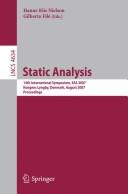
ISSN: 03029743 ISBN: 9783540740605 3540740600 3540740619 Year: 2007 Volume: 4634 Publisher: Berlin, Heidelberg : Springer Berlin Heidelberg : Imprint: Springer,
Abstract | Keywords | Export | Availability | Bookmark
 Loading...
Loading...Choose an application
- Reference Manager
- EndNote
- RefWorks (Direct export to RefWorks)
The aim of static analysis is to develop principles, techniques and tools for validatingpropertiesofprograms,fordesigningsemantics-basedtransformations of programs and for obtaining high-performance implementations of high-level programming languages. Over the years the series of static analysis symposia has served as the primary venue for presentation and discussion of theoretical, practical and innovative advances in the area. This volume contains the papers accepted for presentation at the 14th Int- national Static Analysis Symposium (SAS 2007). The meeting was held August, 22–24, 2007, at the Technical University of Denmark (DTU) in Kongens L- gby, Denmark. In response to the call for papers, 85 submissions were received. Each submission was reviewed by at least 3 experts and, based on these reports, 26 papers were selected after a week of intense electronic discussion using the EasyChair conference system. In addition to these 26 papers, this volume also containscontributionsbythetwoinvitedspeakers:FrankTip(IBMT.J.Watson Research Center, USA) and Alan Mycroft (Cambridge University, UK). On the behalf of the Program Committee, the Program Chairs would like to thank all the authors who submitted their work to the conference and also all the external referees who have been indispensable for the selection process. Special thanks go to TerkelTolstrup and J¨ org Bauer,who helped in handing the submitted papers and in organizing the structure of this volume. We would also like to thank the members of the Organizing Committee at DTU for their great work. Finally we want to thank the PhD school ITMAN at DTU for ?nancial support.
Computer programming --- Programming languages (Electronic computers) --- Programmation (Informatique) --- Langages de programmation --- Congresses --- Congrès --- Computer Science --- Engineering & Applied Sciences --- Congrès --- EPUB-LIV-FT SPRINGER-B --- Computer science. --- Software engineering. --- Computer programming. --- Programming languages (Electronic computers). --- Computer logic. --- Mathematical logic. --- Computer Science. --- Software Engineering/Programming and Operating Systems. --- Programming Languages, Compilers, Interpreters. --- Logics and Meanings of Programs. --- Software Engineering. --- Mathematical Logic and Formal Languages. --- Programming Techniques. --- Algebra of logic --- Logic, Universal --- Mathematical logic --- Symbolic and mathematical logic --- Symbolic logic --- Mathematics --- Algebra, Abstract --- Metamathematics --- Set theory --- Syllogism --- Computer science logic --- Logic, Symbolic and mathematical --- Computer languages --- Computer program languages --- Computer programming languages --- Machine language --- Electronic data processing --- Languages, Artificial --- Computers --- Electronic computer programming --- Electronic digital computers --- Programming (Electronic computers) --- Coding theory --- Computer software engineering --- Engineering --- Informatics --- Science --- Programming --- Logic design. --- Design, Logic --- Design of logic systems --- Digital electronics --- Electronic circuit design --- Logic circuits --- Machine theory --- Switching theory --- Computer programming - Congresses --- Programming languages (Electronic computers) - Congresses
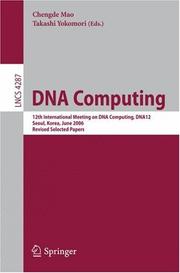
ISSN: 03029743 ISBN: 9783540490241 3540490248 3540684239 Year: 2006 Volume: 4287 Publisher: Berlin ; New York : Springer,
Abstract | Keywords | Export | Availability | Bookmark
 Loading...
Loading...Choose an application
- Reference Manager
- EndNote
- RefWorks (Direct export to RefWorks)
Molecular computers --- Ordinateurs moléculaires --- Congresses. --- Congrès --- Computer Science --- Engineering & Applied Sciences --- Computer science. --- Computers. --- Algorithms. --- Artificial intelligence. --- Bioinformatics. --- Computer Science. --- Computation by Abstract Devices. --- Algorithm Analysis and Problem Complexity. --- Computational Biology/Bioinformatics. --- Artificial Intelligence (incl. Robotics). --- Bio-informatics --- Biological informatics --- Biology --- Information science --- Computational biology --- Systems biology --- AI (Artificial intelligence) --- Artificial thinking --- Electronic brains --- Intellectronics --- Intelligence, Artificial --- Intelligent machines --- Machine intelligence --- Thinking, Artificial --- Bionics --- Cognitive science --- Digital computer simulation --- Electronic data processing --- Logic machines --- Machine theory --- Self-organizing systems --- Simulation methods --- Fifth generation computers --- Neural computers --- Algorism --- Algebra --- Arithmetic --- Automatic computers --- Automatic data processors --- Computer hardware --- Computing machines (Computers) --- Electronic calculating-machines --- Electronic computers --- Hardware, Computer --- Computer systems --- Cybernetics --- Calculators --- Cyberspace --- Informatics --- Science --- Data processing --- Foundations --- Computer software. --- Artificial Intelligence. --- Software, Computer --- Molecular computers - Congresses --- Theory of Computation. --- Computational and Systems Biology.
| Listing 1 - 10 of 33 | << page >> |
Sort by
|

 Search
Search Feedback
Feedback About UniCat
About UniCat  Help
Help News
News